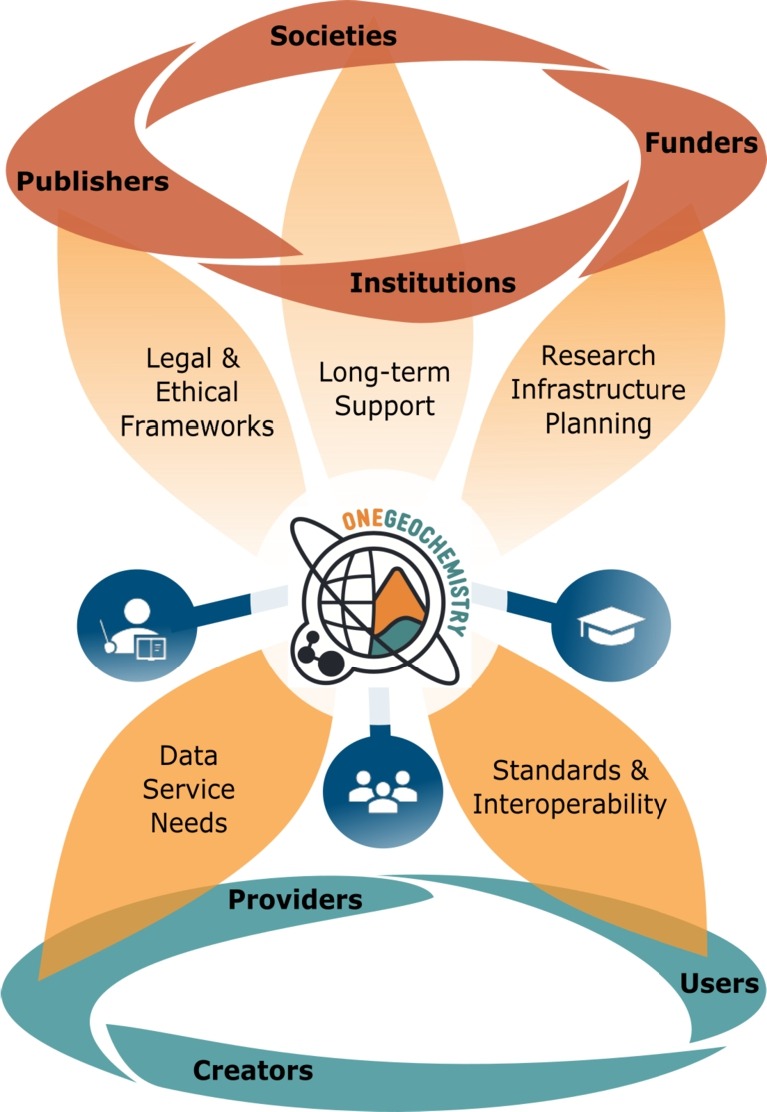Community recommendations for geochemical data, services and analytical capabilities in the 21st century
This work involved input from many individuals during a pre-conference workshop at the Goldschmidt meeting in Honolulu, HI, during 8-9 July 2022. Our goal was to provide the geochemical community with recommendations to improve the existing infrastructure for storing and sharing geochemical data. Together we conceived OneGeochemistry: a community-driven initiative to coordinate the building of a global, online network of machine-readable data that is persistent, interoperable and reusable.
The manuscript was published in Geochimica et Cosmochimica Acta on April 28, 2023. You can find the article here.

Figure: The place of OneGeochemistry within the broader research data landscape (adapted from OECD, 2017). Each group of stakeholders has different needs and motives for contributing to or enforcing FAIR data practices. Blue circles symbolise the role of OneGeochemistry in coordinating expert committees and facilitating education and ambassadorship.
Coauthors
Marthe Klöcking, Lesley Wyborn, Kerstin A Lehnert, Bryant Ware, Alexander M Prent, Lucia Profeta, Fabian Kohlmann, Wayne Noble, Ian Bruno, Sarah Lambart, Halimulati Ananuer, Nicholas D Barber, Harry Becker, Maurice Brodbeck, Hang Deng, Kai Deng, Kirsten Elger, Gabriel de Souza Franco, Yajie Gao, Khalid Mohammed Ghasera, Dominik C Hezel, Jingyi Huang, Buchanan Kerswell, Hilde Koch, Anthony W Lanati, Geertje ter Maat, Nadia Martínez-Villegas, Lucien Nana Yobo, Ahmad Redaa, Wiebke Schäfer, Megan R Swing, Richard JM Taylor, Marie Katrine Traun, Jo Whelan, Tengfei Zhou
Acknowledgements
This manuscript is the result of a workshop held at the Goldschmidt 2022 conference hosted by the Geochemical Society. We thank Jerry Carter (IRIS) and Rob Casey (EarthScope) for helpful comments on the history of the development of data standards in seismology. Jay Pearlman, Rachel Przeslawski and Pauline Simpson provided valuable background information on OBPS. Richard Hartshorn and Leah McEwen provided detailed feedback on the practices in chemistry and crystallography. Michael Badawi, Jieun Kim and Nicolas Randazzo are thanked for their contributions to the Goldschmidt 2022 workshop. We thank Olivier Pourret for helpful comments on the preprint and are grateful to Tao Wen, Penny Wieser and Jamie Farquharson for their thoughtful and constructive reviews. We especially thank Jeff Catalano for the opportunity to publish this review in GCA and for expert editorial handling of the manuscript. MK is supported by the German Research Foundation (DFG grant 437919684). KL and LP acknowledge funding from US NSF Award Number 2148939 and NASA Grant Number 80NSSC19K1102. BW, AMP, and the AuScope Geochemistry Network are supported by AuScope and the National Collaborative Research Infrastructure Strategy (NCRIS). AMP is supported through AuScope which is a beneficiary in the WorldFAIR project, coordinated by CODATA, and funded by the European Union’s HORIZON EUROPE Framework Programme (grant agreement 101058393). SL was supported by the NSF (EAR grant 1946346). NDB acknowledges funding from the NERC Centre for the Observation and Modelling of Earthquakes, Volcanoes and Tectonics (COMET), The Bill & Melinda Gates Foundation (Grant Number OPP1144), and the Gates Cambridge Trust. HB was supported by DFG CRC TRR 170 (project number 263649064). MB and HK are supported by Science Foundation Ireland (SFI) grant 13/RC/2092 and co-funded by iCRAG industry partners. HK is further supported by SFI grant 16/RP/3849. KD thanks the support by the ETH Zurich Postdoctoral Fellowship 20-1 FEL-24. DCH is supported through the NFDI4Earth funded by the DFG (project number 460036893). BK was supported by NSF grant OISE 1545903. AWL was funded by the Geological Society of Australia - Victorian Division, the German Research Exchange Service (DAAD Grant No. 57507869) and the Australian Government Research Training Program (Allocation No. 2018177). WS was funded by DFG grant KE 2395/3-1 (project number 447528294). MKT was supported by Geocenter Danmark (grant nr. GC4-2019). This is contribution 1760 from the ARC Centre of Excellence for Core to Crust Fluid Systems and 1529 in the GEMOC Key Centre.
Abstract
The majority of geochemical and cosmochemical research is based upon observations and, in particular, upon the acquisition, processing and interpretation of analytical data from physical samples. The exponential increase in volumes and rates of data acquisition over the last century, combined with advances in instruments, analytical methods and an increasing variety of data types analysed, has necessitated the development of new ways of data curation, access and sharing. Together with novel data processing methods, these changes have enabled new scientific insights and are driving innovation in Earth and Planetary Science research. Yet, as approaches to data-intensive research develop and evolve, new challenges emerge. As large and often global data compilations increasingly form the basis for new research studies, institutional and methodological differences in data reporting are proving to be significant hurdles in synthesising data from multiple sources. Consistent data formats and data acquisition descriptions are becoming crucial to enable quality assessment, reusability and integration of results fostering confidence in available data for reuse. Here, we explore the key challenges faced by the geo- and cosmochemistry community and, by drawing comparisons from other communities, recommend possible approaches to overcome them. The first challenge is bringing together the numerous sub-disciplines within our community under a common international initiative. One key factor for this convergence is gaining endorsement from the international geochemical, cosmochemical and analytical societies and associations, journals and institutions. Increased education and outreach, spearheaded by ambassadors recruited from leading scientists across disciplines, will further contribute to raising awareness, and to uniting and mobilising the community. Appropriate incentives, recognition and credit for good data management as well as an improved, user-oriented technical infrastructure will be essential for achieving a cultural change towards an environment in which the effective use and real-time interchange of large datasets is common-place. Finally, the development of best practices for standardised data reporting and exchange, driven by expert committees, will be a crucial step towards making geo- and cosmochemical data more Findable, Accessible, Interoperable and Reusable by both humans and machines (FAIR).